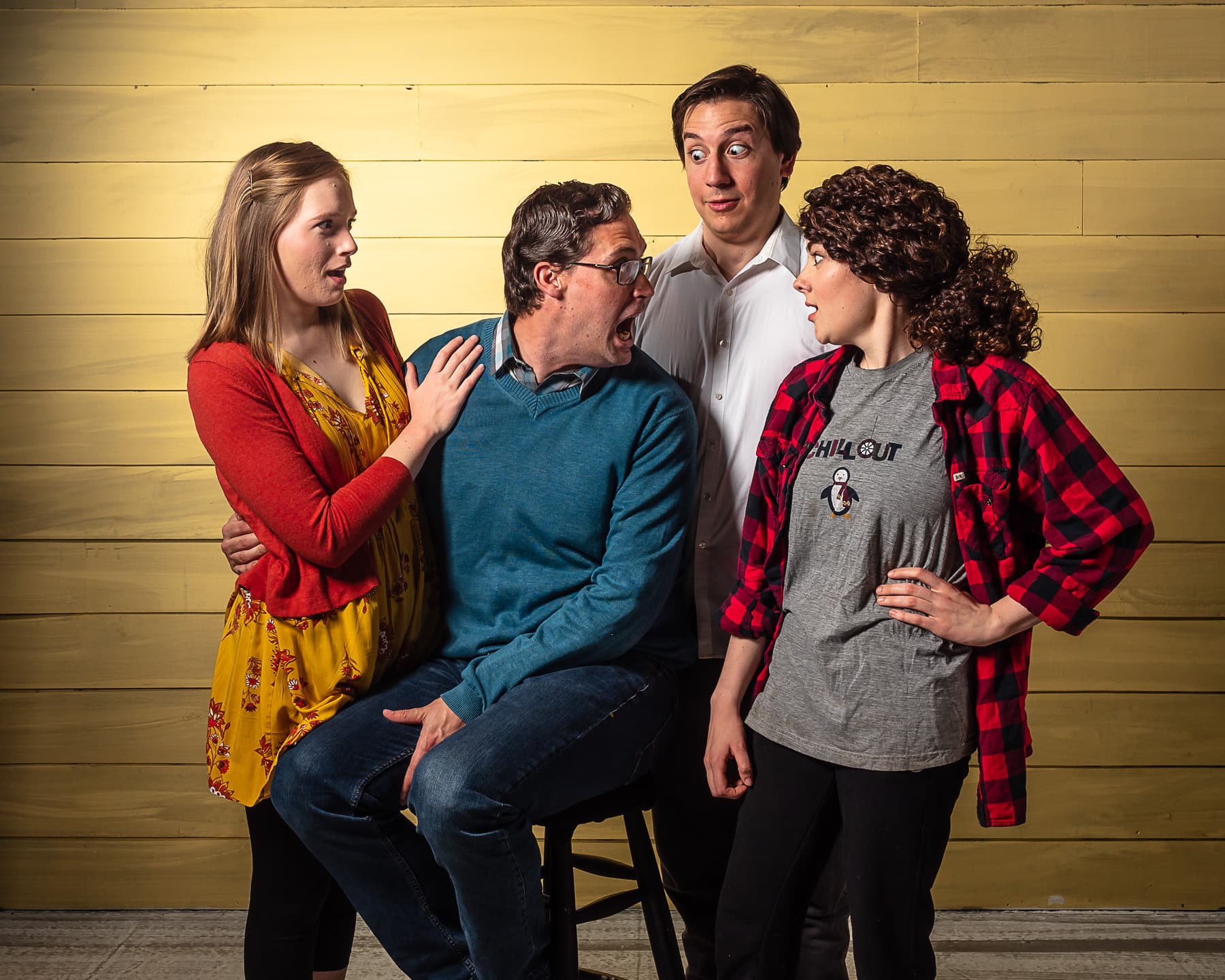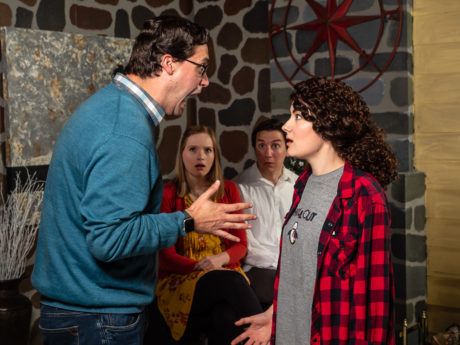A battle between assimilation and affiliation, the personal and historical, Jewish versus Jew-ish. This is Bad Jews, Joshua Harmon’s bitingly witty maiden voyage that put him on the playwriting map. Luckily for us, the eagle has landed in Baltimore at The Vagabond Players.

This award-winning play centers around three twenty-something cousins, brothers Jonah (Michael Kranick) and Liam (Jon Meeker) and their cousin formerly known as Diana (Anna Steuerman), who drank Super Jewce, became Daphna, and has not stopped spewing Mishnah since. They are forced to share an apartment on the evening after their grandfather’s funeral, because the other apartment has been prepared for Shiva (the Jewish mourning period) with tables that are blocking the pull-out couch.
Just to crowd the room even more, the assimilated Liam brings home his shiksa girlfriend, Melody (Molly Mayne), who looks like an American Girl doll and can trace her roots no farther than Delaware. The major plot point of who gets Poppy’s treasured Chai necklace is the backdrop for themes that never go out of style: does religious observance make one more or less of a Jew? Is there a right or wrong way to honor someone’s memory? Does this thing, this object, represent the loved one best, or is everyone missing the point?
Director Miriam Bazensky uses the small, historical space in The Vagabond Theatre to amplify the cramped quarters of this New York apartment while still allowing the cast to move about freely. Her blocking keeps the action moving for the entire 90 minutes without the “director told me to move here” syndrome, with every character’s movement deliberate and purposeful. Bazensky is masterful at creating a family, employing the use of incessant overlapping dialogue, which not only keeps the play moving at breakneck speed, but also resembles a real family’s comfort, familiarity, and meshugas. This creates authenticity throughout the entire production, making the audience feel as if it were spying on this family through a one-way mirror.
The script is ripe with snappy dialogue and “I cannot believe she just said that” moments (not fit for print). When chastising Liam for his decision to marry a shiksa, Daphna spits, “Do you want your children to be half Jew, half Delaware?” A familiar moment of levity and camaraderie comes when the cousins bond over the gastrointestinal issues that plagued their Poppy after eating at Benihana; their hysterics as they imitate their grandfather’s excessive, loud gas strikes the perfect chord, especially with Melody looking on in disgust, her gentility now violated. In another instant, uttering a line worthy of a post-show talkback, Daphna says to Liam, “Now that it’s finally safe to be a Jew, you want to stop being Jewish?” It’s evident that this show runs the emotional gamut, and does so with finesse and purpose.

This ensemble carries the show without so much as a breath between screams. Jonah is Switzerland, the younger brother who just wishes that everyone would stop fighting and leave him out of it. Mike Kranick’s innocent, charming face fits the character’s “who, me?” shtick and he has some great comic moments with his non-verbal reactions. As Liam, Jon Meeker, a Bob Saget doppelgänger whose lanky frame and oversized glasses capture the essence of the character, really gets going when he verbally spars with Daphna. In these moments, he hits all the right notes with his timing, brutal honesty, and in-your-face assimilation. Molly Mayne is just perfect as Melody, with straight blonde hair, a barrette, and a giant tattoo of a musical note on her leg “to remind me that I love music.” She plays the innocent, corn-fed ivory girl with charm and energy, and strikes a balance with Steuerman’s Daphna that makes their scenes engaging and tense.
Anna Steuerman as Daphna is a clear standout. She vomits emotion, heart, poignancy, spite, jealousy, and righteous indignation, spitting out hilarious dialogue with the undercurrent of tragic loneliness. She garners sympathy with her multi-layered portrayal; one can see just from the look in her eyes that she is feeling pain under her abrasive “Jew hair.” She also happens to have impeccable comic timing. Steuerman is reason alone to buy a ticket, but luckily, there are other reasons.
Lighting designer Masha Miriam Grady uses downstage lights to distinguish between the apartment and hallway, which consists only of dimming the main stage and highlighting the front. It’s a clever and simple way to separate the spaces, illustrating that one does not need to build a sound stage to reach the audience. Sound designer Eric C. Stein opens the show with New York City traffic sounds that give the impression that they’re coming from several stories below, with just the right amount of voices and honking. Stein also nails the sound of Jonah’s video game; this writer found herself looking around for her teenage son and his Xbox.
Set designer Maurice “Moe” Conn creates a modest, appropriate backdrop for the action, with a well-placed corner bar that stores everything from a laptop computer to a banana. The walls and doorway are placed to allow for distinction between spaces without overdoing the mechanics. The set dressing captures the essence of an oversaturated sleepover by force, with mismatched blankets and old pillowcases that look like they came off of one of the boys’ preteen beds. This is what you do when people suddenly descend upon your home: you drag out the old linens that you save just in case you need them one day.
Bad Jews is funny, relevant, thought-provoking and moving, with surprises along the way. It never answers the question of what makes one a good or bad Jew, but it puts the questions out there for all to chew, and that’s what good theatre is all about.
Running Time: Approximately 90 minutes, with no intermission. Contains adult language: appropriate for ages 14 and up.
Bad Jews runs weekends through June 24, 2018, at The Vagabond Players, Inc., 806 South Broadway, Baltimore, MD 21231. Performances are Fridays and Saturdays at 8:00 PM and Sundays at 2:00 PM. For tickets and information, contact the box office at (410) 563-9135 or purchase online.




